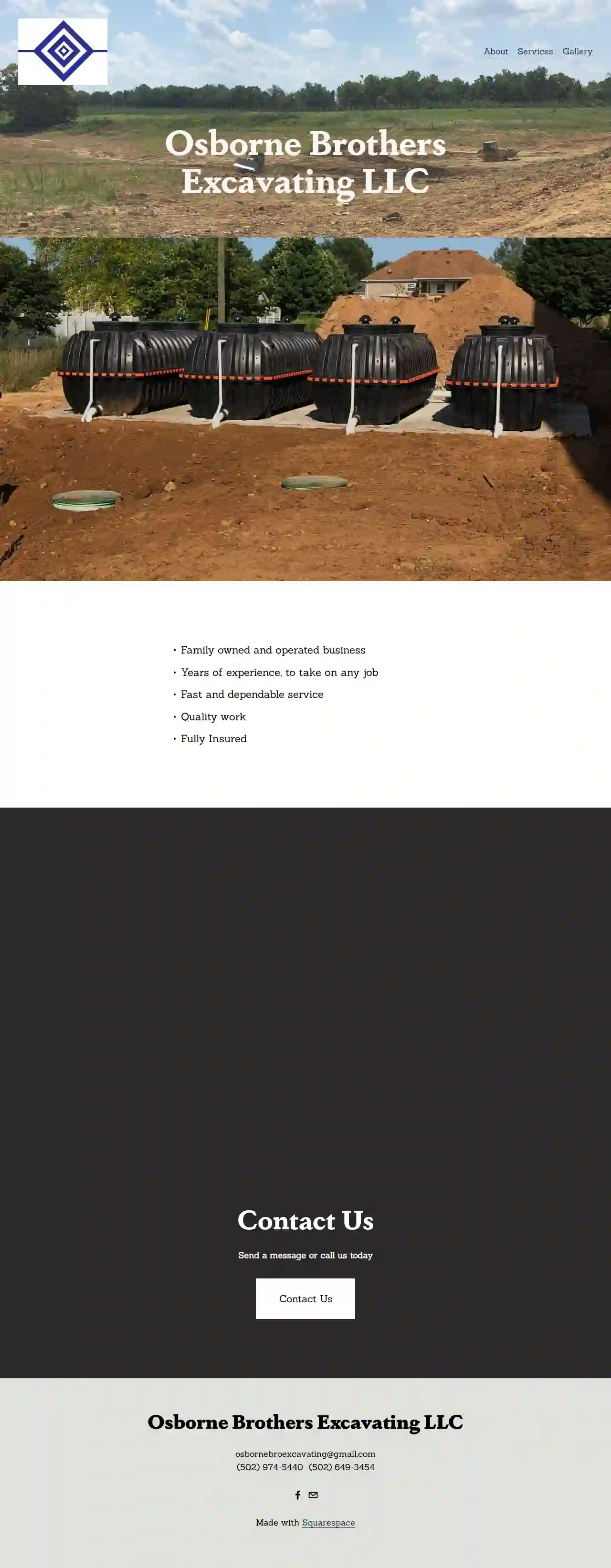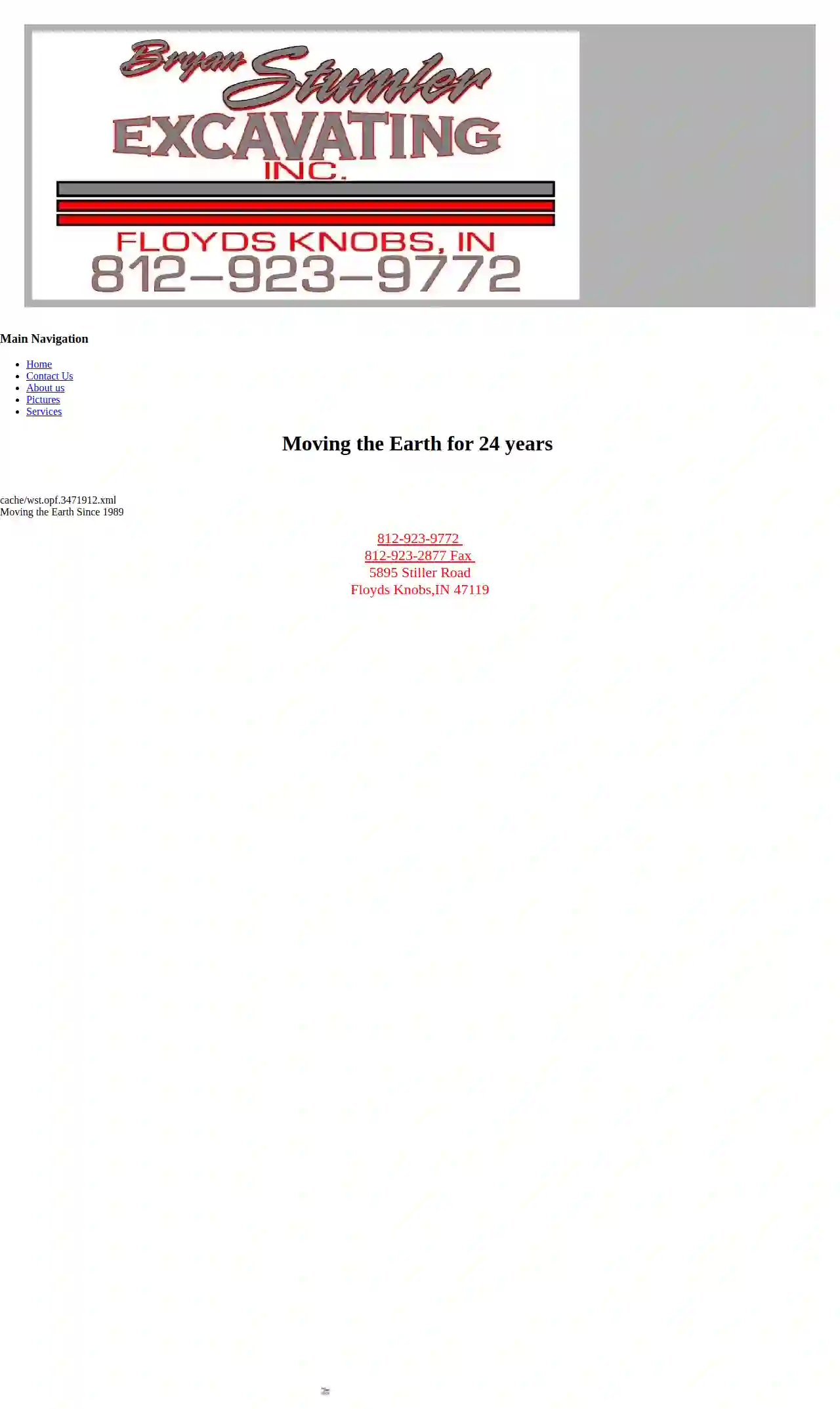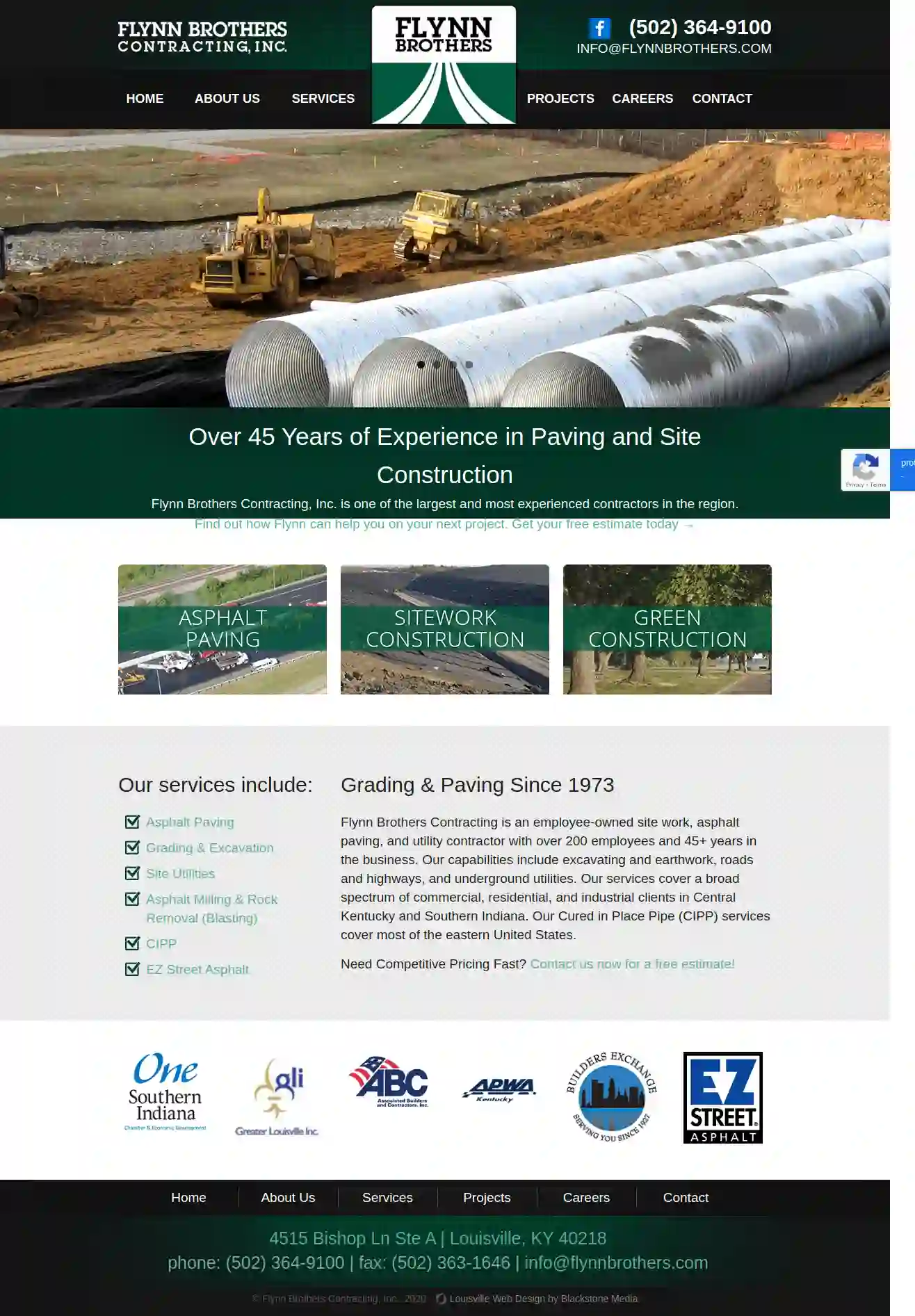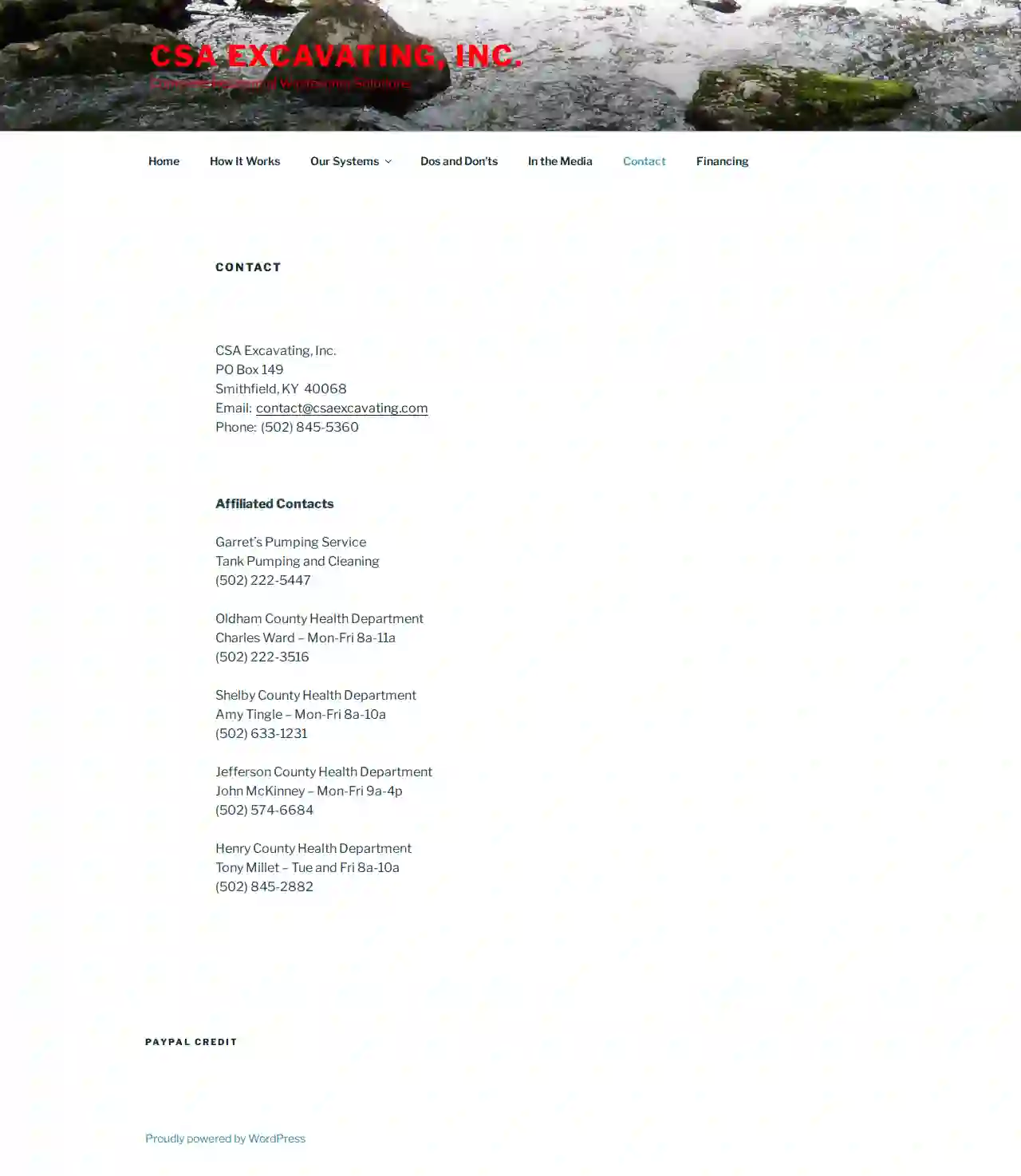Excavation Contractors Bowling Green
Top 10 Excavation Contractors Near Me in Bowling Green
Receive multiple Excavation Contractors Near Me quotes for your project today! Compare profiles, reviews, accreditations, portfolio, etc... and choose the best deal.

Garney Construction
51 reviewsLouisville, USBuilding sustainable futures with the world's most precious resources: Water and People.® Garney is a national leader in water and wastewater construction. Since 1961, we’ve focused on building water and wastewater systems of all sizes for municipal, federal, industrial, and private clients. We specialize in collaborative project delivery solutions, including CMAR and design-build, for our clients nationwide.
- Services
- Why Us?
- Gallery
Get Quote
Osborne Brothers Excavating
53 reviewsLouisville, USOsborne Brothers Excavating LLC Osborne Brothers Excavating is a family owned and operated business with years of experience, ready to tackle any job. We provide fast and dependable service, ensuring quality work and are fully insured for your peace of mind.
- Services
- Why Us?
- Gallery
Get Quote
Bryan Stumler Excavating
4.68 reviews5895 Stiller Road, Floyds Knobs, 47119, USAbout Bryan Stumler Excavating Bryan Stumler Excavating is a family-owned and operated business located in Floyds Knobs, Indiana. We have been serving the Southern Indiana area since 1989, providing high-quality excavation and construction services for both residential and commercial clients. Our team of experienced professionals is dedicated to delivering exceptional results on every project, no matter how big or small. We take pride in our commitment to customer satisfaction and strive to build lasting relationships with our clients. We believe in open communication and transparency throughout the entire project process, ensuring that our clients are informed and involved every step of the way. Whether you need a new pond dug, a driveway installed, or a complete site preparation for a new construction project, Bryan Stumler Excavating has the expertise and equipment to get the job done right. We are committed to using the latest technology and techniques to ensure that our projects are completed efficiently and to the highest standards. Contact us today to discuss your project needs and learn how Bryan Stumler Excavating can help you achieve your goals.
- Services
- Why Us?
- Gallery
Get Quote
Stewart Contracting
2.58 reviewsLexington, USWelcome to Stewart Contracting! Stewart Contracting is here to build for you. We offer free quotes and specialize in Barn Building in Lexington, Paris, Versailles and all over Central Kentucky. Our crew is trained to work around your horses and understand safety first when it comes to your horses. References available! RESIDENTIAL or COMMERCIAL Paris, Lexington, Georgetown, Versailles, Nicholasville, Lancaster, Danville and Lexington call Ken 859-621-9011 / FREE QUOTES AVAILABLE Your Central Kentucky General Contractor should be someone who: Has a thorough knowledge and understanding of the coordination and scheduling issues of your construction project Gets things done ON TIME and ON BUDGET Has a team of professionals who works with him to achieve Total Client Satisfaction Has 30 years of experience in Central Kentucky as a General Contractor and hundreds of satisfied customers Takes pride in producing structures that are sound in construction, highly crafted and exquisitely finished Is fully licensed and insured Guarantees their work Works within your Budget Provides Clean, Trustworthy and Dependable Employees Stewart Contracting is proud to be able to say we are this kind of Central Kentucky General Contractor. We are committed to saving you money during the design phase of your project until completion. We are ready to work on all types of buildings, including equine buildings, residential homes and commercial buildings. Our work can include land leveling through the final landscaped finishes. General Contracting for the Equine Industry is our specialty. Our corporate mission is TOTAL client satisfaction by achieving the construction objectives of: quality, on time delivery and staying within the budgets set within every project. This approach ensures that the finished project will compliment the character and the identity of the owner by making a visual statement of design and project criteria.
- Services
- Why Us?
- Gallery
Get Quote
Flynn Brothers Contracting, Inc.
325 reviews4515 Bishop Ln Ste A, Louisville, 40218, USOver 45 Years of Experience in Paving and Site Construction Flynn Brothers Contracting, Inc. is one of the largest and most experienced contractors in the region. Find out how Flynn can help you on your next project. Get your free estimate today → Grading & Paving Since 1973 Flynn Brothers Contracting is an employee-owned site work, asphalt paving, and utility contractor with over 200 employees and 45+ years in the business. Our capabilities include excavating and earthwork, roads and highways, and underground utilities. Our services cover a broad spectrum of commercial, residential, and industrial clients in Central Kentucky and Southern Indiana. Our Cured in Place Pipe (CIPP) services cover most of the eastern United States. Need Competitive Pricing Fast? Contact us now for a free estimate!
- Services
- Why Us?
- Gallery
Get Quote
JET Excavation
53 reviewsLexington, USJET Excavation: Your Trusted Partner for Excavation and Site Work JET Excavation is a locally owned and operated company dedicated to providing exceptional excavation and site work services to both commercial and residential clients in the area. We take pride in our work, ensuring integrity and attention to detail in every project. Our commitment to customer satisfaction sets us apart, and we strive to exceed expectations with every job. We understand that your project is unique, and we work closely with you to ensure your vision is realized. From site clearing and excavation to soil compacting and erosion control, we handle all aspects of your project with expertise and efficiency. Contact us today to discuss your project needs and let us demonstrate why JET Excavation is the right choice for you.
- Services
- Why Us?
- Gallery
Get Quote
Sanctuary Forestry Mulching
51 reviews4200 Nutmeg Drive, Lexington, 40513, USWho We Are Looking for a reliable and experienced land clearing and forestry mulching business in Kentucky? Look no further! Our company serves the state of Kentucky, providing top-quality services to both residential and commercial clients. We specialize in all aspects of land clearing, from small backyards to large commercial lots. Our team is equipped with industry-leading equipment and machinery, ensuring efficient and timely completion of projects. With our expertise, we are able to clear land without damaging the surrounding trees or vegetation. No matter the size or scope of your land clearing or forestry mulching project, we have the resources and expertise to get it done efficiently and effectively. Contact us today for a free consultation and see why we are the go-to land clearing and forestry mulching business in Kentucky! About Us Our company has been serving the state of Kentucky for many years, providing top-quality services to both residential and commercial clients. We specialize in all aspects of land clearing, from small backyards to large commercial lots. Our team is equipped with industry-leading equipment and machinery, ensuring efficient and timely completion of projects. With our expertise, we are able to clear land without damaging the surrounding trees or vegetation. No matter the size or scope of your land clearing or forestry mulching project, we have the resources and expertise to get it done efficiently and effectively. Contact us today for a free consultation and see why we are the go-to land clearing and forestry mulching business in Kentucky! Our Values We believe in treating others with respect and dignity, taking pride in a job well done, and communicating honestly, authentically, and clearly.
- Services
- Why Us?
- Gallery
Get Quote
CSA Excavating
32 reviewsLouisville, US- Services
- Why Us?
Get Quote- Mo
Morrison Excavation & Land Improvement LLC
3.97 reviewsLexington, US- Services
- Why Us?
- Gallery
Get Quote 
Bristol Group, LLC
4.225 reviewsLexington, US- Services
- Why Us?
Get Quote
Over 3,943+ Excavation Contractors onboarded
Our excavation contractors operate in Bowling Green and surroundings!
ExcavationHQ has curated and vetted the Best Excavation Pros in and around Bowling Green. Find a reliable contractor today.
Frequently Asked Questions About Excavation Contractors
- Clearly Define the Scope: Outline the project's goals, including the excavation area, depth, grade, and intended use.
- Obtain Necessary Permits: Research and acquire any required permits from your local authorities.
- Mark Utility Lines: Contact your utility companies to locate and mark underground utilities to prevent damage.
- Communicate with Neighbors: Inform your neighbors about the project's timeline and potential noise or disruptions.
- Prepare the Site: Clear any obstacles, such as vegetation, furniture, or structures, from the excavation area.
- Discuss Safety Protocols: Review safety procedures with the contractor to ensure a safe work environment.
- Utility Locates: Contact your utility companies to mark the locations of underground lines before excavation begins. This is usually a free service.
- Hand Digging: Excavate carefully by hand near marked utility lines to avoid damage.
- Potholing: Digging small test holes to expose and verify utility depths and locations.
- Safe Distances: Maintaining a safe distance between excavation equipment and marked utility lines.
- Vacuum Excavation: Using vacuum excavation techniques to expose utilities without digging, reducing the risk of damage.
- Topsoil Removal: Stripping the fertile topsoil layer from a site, often preserving it for landscaping.
- Trench Excavation: Digging long, narrow trenches for utilities (pipes, cables) or foundations.
- Basement Excavation: Removing earth to create a space for a basement beneath a structure.
- Pool Excavation: Digging a precise hole for installing a swimming pool.
- Roadway Excavation: Removing earth and preparing the ground for road construction.
- Demolition Excavation: Clearing debris and preparing the site after demolition.
- Channel Excavation: Creating channels for drainage or irrigation.
What should I do before excavation starts?
What is the difference between cut and fill excavation?
Cut: Involves excavating soil from an area where the existing grade is higher than the desired grade.
Fill: Refers to using the excavated soil ('cut' material) to raise the grade in an area where the existing grade is lower than desired.
This method minimizes the need to import or export soil, reducing costs and environmental impact. It's commonly used for site preparation, road construction, and landscaping.
How do you protect utilities during excavation?
What are the different types of excavation?
What should I do before excavation starts?
- Clearly Define the Scope: Outline the project's goals, including the excavation area, depth, grade, and intended use.
- Obtain Necessary Permits: Research and acquire any required permits from your local authorities.
- Mark Utility Lines: Contact your utility companies to locate and mark underground utilities to prevent damage.
- Communicate with Neighbors: Inform your neighbors about the project's timeline and potential noise or disruptions.
- Prepare the Site: Clear any obstacles, such as vegetation, furniture, or structures, from the excavation area.
- Discuss Safety Protocols: Review safety procedures with the contractor to ensure a safe work environment.
What is the difference between cut and fill excavation?
Cut: Involves excavating soil from an area where the existing grade is higher than the desired grade.
Fill: Refers to using the excavated soil ('cut' material) to raise the grade in an area where the existing grade is lower than desired.
This method minimizes the need to import or export soil, reducing costs and environmental impact. It's commonly used for site preparation, road construction, and landscaping.
How do you protect utilities during excavation?
- Utility Locates: Contact your utility companies to mark the locations of underground lines before excavation begins. This is usually a free service.
- Hand Digging: Excavate carefully by hand near marked utility lines to avoid damage.
- Potholing: Digging small test holes to expose and verify utility depths and locations.
- Safe Distances: Maintaining a safe distance between excavation equipment and marked utility lines.
- Vacuum Excavation: Using vacuum excavation techniques to expose utilities without digging, reducing the risk of damage.
What are the different types of excavation?
- Topsoil Removal: Stripping the fertile topsoil layer from a site, often preserving it for landscaping.
- Trench Excavation: Digging long, narrow trenches for utilities (pipes, cables) or foundations.
- Basement Excavation: Removing earth to create a space for a basement beneath a structure.
- Pool Excavation: Digging a precise hole for installing a swimming pool.
- Roadway Excavation: Removing earth and preparing the ground for road construction.
- Demolition Excavation: Clearing debris and preparing the site after demolition.
- Channel Excavation: Creating channels for drainage or irrigation.